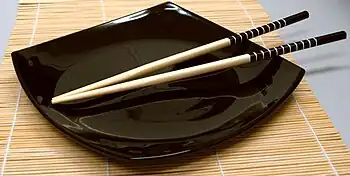筷子
Chinese
| chopstick | child; son; (noun suffix) child; son; (noun suffix); small thing; seed; egg; 1st earthly branch; 11 p.m.–1 a.m., midnight | ||
|---|---|---|---|
| trad. (筷子) | 筷 | 子 | |
| simp. #(筷子) | 筷 | 子 | |
| alternative forms | 快子 | ||
Etymology
The Old Chinese words for "chopsticks" were 箸 (OC *das) and 梜 (OC *keːb). 箸 is preserved in almost all Min dialects (Taiwanese tī, tū; Fuzhou dê̤ṳ) and some other dialects, especially those in some contact with Min; it is also preserved in loans to other languages, e.g. Korean 젓가락 (jeotgarak), Vietnamese đũa and Zhuang dawh. Starting from the Ming Dynasty, the change to 筷子 occurred in Mandarin, Wu and some Cantonese dialects. The 15th century book Shuyuan Miscellanies (《菽園雜記》) by Lu Rong (陸容) mentioned this change:
- 如舟行諱「住」……,以「箸」為「快兒」 [Classical Chinese, trad.]
- Rú zhōuháng huì “zhù”......, yǐ “zhù” wéi “kuàir” [Pinyin]
- As mariners regarded 住 (zhù, “to stay; to stop (in the sea)”) as a taboo […], they called 箸 (zhù, “chopsticks”) 快兒 (lit. "quick + diminutive suffix").
如舟行讳「住」……,以「箸」为「快儿」 [Classical Chinese, simp.]
Pronunciation
Noun

筷子
Synonyms
Dialectal synonyms of 筷子 (“chopsticks”) [map]
Classifier
筷子
- Classifier for an amount of food held with a pair of chopsticks.
- 2019, 马可·博格斯 [Marco Borges], translated by 黄温馨 and 陈思鹏, 《终生健身:找回灵活使用身体的本能》 [Power Moves: The Four Motions to Transform Your Body for Life], Beijing: 中国友谊出版公司, →ISBN, page 237:
This article is issued from Wiktionary. The text is licensed under Creative Commons - Attribution - Sharealike. Additional terms may apply for the media files.